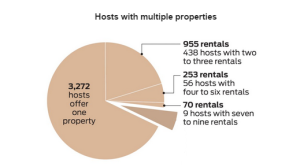90 Days and 90 Nights
Vacation Rentals Limited to a Quarter of the Year by Regulation

In Tuesday’s blog, we discussed how London is set to approve short-term rentals, and how hotels were attempting to block this. Today, we’re talking about just what the new law means for owners of vacation rental properties in London. London is to join San Francisco in permitting short-term vacation rentals, but for only 90 days out of the year. Ostensibly, the vacation rental industry just received a big boost. The industry has just been legalized and been given defined regulation. The question is, what will this mean for hosts in the city and what do you do with the other 275 days of the year?
Full-time hosts will be forced to rent their properties to more long-term guests like students or business travelers for the rest of the year. Managers will have to choose the time of year when they want to use their properties for their vacation rental businesses. For many owners, 90 days, a quarter of the year is not enough.
It is important to consider that while this regulation has effectively only just legalized short-term rentals, the industry was booming before this period. When it was basically illegal the industry still managed to thrive. Is this regulation a way to actually curtail short-term rentals? The limits before were poorly defined and people used this to their advantage. The enforcement was sporadic and ineffective. Have governments realized that this might actually be a way to reduce short-term rentals in a real way?
If you go from renting your property out for the entire year, to be forced to limit this to 90 days, it means that property owners will aim to get more revenue from these 90 days. This means that the high season could become ultra-expensive, with every professional host saving their quota of 90 days for the summer and public holidays. This, combined with part-time hosts renting out their properties whilst they are away over the summer means that there could be dramatic peaks and troughs in the pricing of accommodations.
This means that one of the most attractive features of vacation rentals for guests, the low price, is likely to rise as every host has to capitalize on their 90 days of potential revenue. The gap in price between hotels and vacation rentals will be narrowed and the services and trusted brands of hotels mean they will be able to reclaim some guests. As mentioned in our previous blog post, opposition from the hotel industry has cited concerns over standards of safety and cleanliness and the impact of tourism on local residents as well as concern for their customer base.
So, how about a two-tier system? One that allows people to utilize their properties when they are not in them and another that recognizes professional hosts. This second tier for professional owners would be more regulated, requiring licenses and inspections to ensure quality and measured amounts of hosts in each area with licenses being rescinded for violations. Could having well-dispersed hosts that meet standards of quality, safety, and social responsibility be a way to leaven the problem? Are professional hosts not going to be more invested in ensuring standards of safety and quality? If you had a set number of ‘host licenses’ in areas you could effectively regulate the industry and standardize quality whilst still allowing the population of the city to utilize their empty properties for the planned 90 days.
By allowing unregulated short-term rentals for 90 days, the London council is tacitly saying that short-term rentals by homeowners do not compromise the ‘residential integrity’ of local areas. What it doesn’t limit is the amount permitted in one area or the times when the properties can be rented. With the upcoming regulation, there is nothing to stop low-quality or unsafe rentals operating in a cluster, either close to residential areas or in established hotel territory. As well as being grouped together in terms of proximity, the 90-day regulation means that these properties are likely to be operating in a concentrated area and during a concentrated time period. This is being coupled with plans to continue adding 2000 extra hotel rooms to the current total every year until 2026. Is this not a recipe to create effective tourist ‘ghettos’ the centers of cities like London during the most popular months?
These professional hosts are not the destructive force that they can be painted as.
To use an example of San Francisco, having a similar regulation, the majority of hosts are renting out their only property. Professional hosts make up only a small part of the demographic.

Actively promoting hotel growth and ignoring the population of full time hosts is not a complete solution. This 90 day regulation is unlikely to be the last amendment to London’s and other city’s rental regulations that we see.
Would this regulation put you off expanding your business into these cities?







